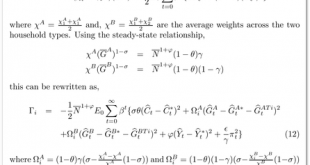from Peter Radford I have become quite a fan of David Ciepley this summer. He, amongst many I am sure, is blazing a trail through the morass of corporate law and providing new insights into the role and status of the animal we know as the “corporation”. Anyone with an interest in the role business plays in the economy needs to understand what Ciepley is saying. In one talk he gave, at MacGill University, the introductory remarks by his host were illumination in themselves. The occasion...
Read More »At last – Paul Romer got his ‘Nobel prize’
from Lars Syll Among Swedish economists, Paul Romer has for many years been the favourite candidate for receiving the ‘Nobel Prize’ in economics. This year the prediction turned out right. Romer got the prize (together with William Nordhaus). The ‘Nobel prize’ in economics has almost exclusively gone to mainstream economists, and most often to Chicago economists. So how refreshing it is that we for once have a winner who has been brave enough to openly criticize the ‘post-real’ things...
Read More »Stiglitz vs. Summers
from David Ruccio Two giants of mainstream economics—Joseph Stiglitz and Lawrence Summers—have been engaged in an acrimonious, titanic battle in recent weeks. The question is, what’s it all about? And, even more important, what’s at stake in this debate? At first glance, the intense, even personal back-and-forth between Stiglitz and Summers seems a bit odd. Both economists are firmly in the liberal wing of mainstream economics and politics—as against, for example, Gene Epstein (an...
Read More »Chicago economics — utterly and completely wrong
from Lars Syll Every dollar of increased government spending must correspond to one less dollar of private spending. Jobs created by stimulus spending are offset by jobs lost from the decline in private spending. We can build roads instead of factories, but fiscal stimulus can’t help us to build more of both. This form of “crowding out” is just accounting, and doesn’t rest on any perceptions or behavioral assumptions. John Cochrane The problem with this view is, of course, that it is...
Read More »No one told Greg Mankiw about the Great Recession
from Dean Baker We all know how difficult it is for elite economists at places like Harvard to get information about the economy, so perhaps we should excuse him for this little mess up. Of course if he had heard of the Great Recession he would not be writing a piece in the New York Times telling us that trade deficits really don’t matter: “Nations run trade deficits when their spending on consumption and investment, both private and public, exceeds the value of goods and services they...
Read More »New Keynesian nonsense ‘proofs’
from Lars Syll New Keynesians use mathematics to ‘prove’ some very odd stuff … Take, for example, a paper by Campbell Leith and Simon Wren-Lewis entitled Electoral Uncertainty and the Deficit Bias in a New Keynesian Economy. The thrust of the paper is that our particular form of party-based democracy naturally leads to ‘deficit bias’ … The authors identify the root problem to be one of ‘heterogeneity’ — the fact that different political parties will have different views about how to run...
Read More »Short-termism: culture or power?
from Shimshon Bichler and Jonathan Nitzan and current issue of the RWER At stake here is the connection between the two key quantities of the capitalist nomos – the price of capital and its underlying earnings – so the question is obviously important. Yet, to the best of our knowledge, that question has never been asked, let alone answered. Indeed, as far as we know, the V‑shape pattern of the short-term price-EPS correlation shown in Figures 3 and 4 is a new finding. It is common to...
Read More »Krugman vs. Keen
from John Balder and the current issue of the RWER To explore the origins of the global financial crisis, the first step is to specify the relationship between banking, money and credit. According to the mainstream view, a bank serves as an intermediary between a borrower and a lender. As a pure intermediary, a bank has no impact on real economic activity. This view – taught in most Economics 101 textbooks – implicitly assumes that money is available in finite quantities that are...
Read More »Sweet Nothings – Eliot Dean Baker (Lyric Video)
Capital and class
from David Ruccio and Jamie Morgan and the current issue of the RWER The premise and promise of capitalism, going back to Adam Smith, have been that global wealth would increase and serve as a benefit to all of humanity.[1] However, the experience of recent decades has challenged those claims: while global wealth has indeed grown, most of the increase has been captured by a small group at the top. This has continued into the “recovery” in the United States and globally. The result is that...
Read More » Real-World Economics Review
Real-World Economics Review




